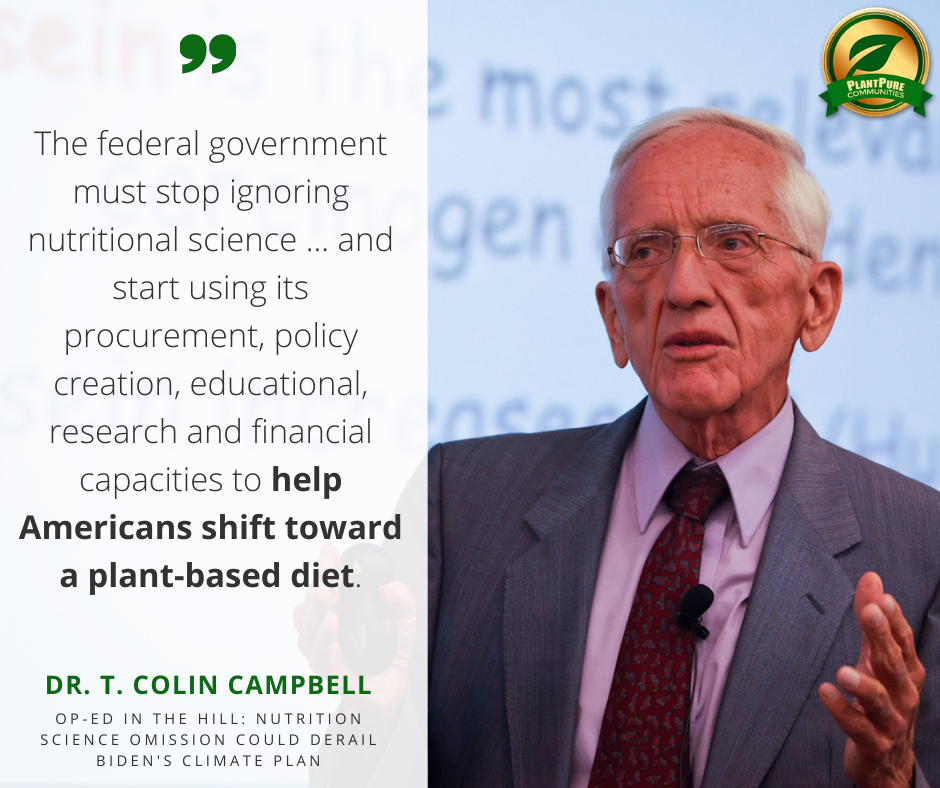
Right now, America’s climate plan is being created per President Biden’s January 27 Executive Order. Once created, it will presumably guide the nation’s procurement, educational, research, and financial capacities across multiple agencies for at least the next few years. Despite the fact that the US Department of Agriculture (USDA) has the primary responsibility for policies that impact our food choices (and 75% of the USDA Farm Bill funding is for food and nutrition!), to date, the USDA has ignored the nexus between climate and diet/nutrition science.
We need your help in getting the word out about how important it is for the Biden Administration to integrate nutritional science and food choice (and the emissions associated with consumption of the food we choose to eat) into its plan to combat climate change. You can do that by taking these 2 steps:
- Share Dr. T. Colin Campbell’s recent Op-Ed published by The Hill: https://tinyurl.com/thehilloped – Check out the sample post language and graphic below.
- Submit a comment (April 29 deadline) to the USDA re: their climate action plan: https://federalregister.gov/d/2021-05287 – Feel free to draw from the Op-Ed and also from PPC’s comments (also below).
PPC’s work is aimed at a broad population shift to reduce demand for animal-based foods in order to mitigate climate change, reduce diet-related chronic diseases and healthcare costs, and strengthen our ability to protect ourselves against the coronavirus and future viral pandemics. Thank you for taking action!
Sample Social Media Post & Graphic
“The federal government must stop ignoring nutritional science … and start using its procurement, policy creation, educational, research and financial capacities to help Americans shift toward a plant-based diet.” – Dr. T. Colin Campbell
Note: To download the graphic, right click the image and select “save as” to save it to your computer. Or you can share PPC’s Facebook post linked here.
Public Comment Submitted by PlantPure Communities
on The Executive Order on Tackling the Climate Crisis at Home and Abroad (Docket No. USDA-2021-0003)
March 19, 2021
Meat production fuels deforestation and accounts for at least 18 percent of all greenhouse gas (GHG) emissions. A significant reduction in meat and dairy consumption would reduce methane emissions from cattle and manure, nitrous oxide emissions from animal feed production and deforestation for cattle pasture and animal feed cropland. In fact, failing to reduce meat consumption will make it impossible to achieve the Paris Agreement goal of staying well below a 2 degrees Celsius global temperature rise. The federal government must stop ignoring nutritional science, which primarily determines food choice, and start using its procurement, policy creation, educational, research and financial capacities to help Americans shift toward a plant-based diet. (See: https://tinyurl.com/thehilloped) It is crucial that the Biden Administration’s plan to combat climate change integrate nutrition science and food choice (and the emissions associated with consumption of the food we choose to eat) by:
- Working collaboratively across agencies (including but not limited to USDA, USEPA, HHS and the CDC) to lead a public campaign to educate Americans about the health and climate impacts of our food choices, grounded in evidence-based nutrition science.
- Creating a National Institute of Health for Nutrition.
- Providing resources and incentives to encourage the education of medical students, doctors and other healthcare professionals about evidence-based nutrition science and the power of food to address chronic diseases (such as diabetes, heart disease, hypertension, obesity and more); and to help strengthen the population to withstand future viral pandemics.
- Supporting public, corporate and institutional initiatives aimed at enhancing the availability of healthy and delicious plant-foods in restaurants, grocery stores, hospitals, schools and elsewhere. This includes but is not limited to:
- increasing plant-based food purchasing, promotion, education and access through the National School Lunch and Breakfast Program and other public feeding programs (seniors, child care centers, etc) and SNAP-Ed nutrition education programs.
- Promoting climate-friendly, plant-based food procurement and healthy food service among all federal agencies (including military and veterans hospitals, etc)
- Supporting universal free meals, ensuring the National School Lunch and Breakfast programs standards reflect the best nutrition science; and supporting farm to school and public school kitchen improvements to enable scratch-cooking.
- Dramatically expanding the Gus Shumacher Healthy Food Incentive Program in SNAP.
- Strengthening and supporting strategies developed by authentic local leaders and adjusting subsidies to ensure that affordable healthy food is consumed in low income areas and communities of color.
- Placing a moratorium on new factory farms, regulating existing factory farms, rolling back ag-gag laws, and making public their inspection. In neighborhoods where factory farms operate, community leaders should have a role in protecting their neighborhoods from environmental degradation; and consumers should be afforded the knowledge about where their food comes from.
- Overhauling the Dietary Guidelines to reflect the best evidence-based nutrition science, free of influence by the food industry.
- Shifting farm policy, resources and subsidies to encourage American farmers to voluntarily produce healthy, sustainable plant foods for human consumption.
